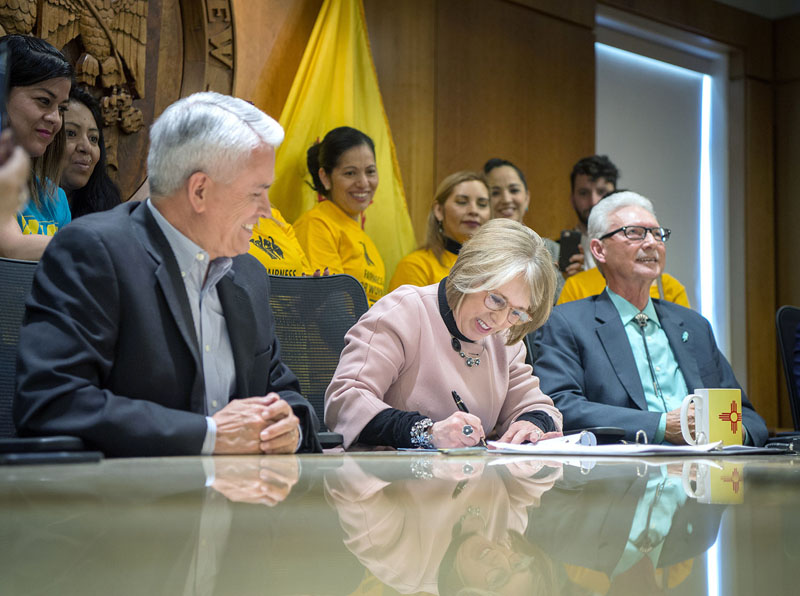SANTA FE — New Mexico’s minimum wage will increase to $12 an hour by 2023 — and to $9 an hour next year — under legislation signed into law Monday by Gov. Michelle Lujan Grisham.
The increase will affect an estimated 110,000 workers — most of them women — and will mark the first statewide minimum wage hike in more than a decade, after several proposed wage adjustments were vetoed by Lujan Grisham’s predecessor, former Gov. Susana Martinez, a Republican.
“New Mexicans have waited too long on this,” Lujan Grisham said during a ceremonial bill signing in the Governor’s Office, as members of several immigrant rights groups that pushed for increasing the state’s minimum wage looked on.
Although some cities have enacted higher local minimum wage ordinances, New Mexico’s current statewide minimum wage of $7.50 an hour has not gone up since 2009.
Lujan Grisham, a Democrat who took office in January, made a minimum wage increase a central part of her platform in her campaign for governor, arguing that boosting workers’ pay would improve the state’s economy.
But finding consensus on a minimum wage bill proved difficult during the 60-day session that ended last month, as some senators balked at a House-approved plan that would have included tying future wage increases to inflation and instead advanced a less aggressive plan.
A compromise was brokered during the session’s final days that does not call for future increases, although Lujan Grisham suggested Monday that she would push for additional increases to the minimum wage if she’s still governor in 2023.
“I’ll be frank with you: It wasn’t easy — it got testy at times,” said Sen. Clemente Sanchez, D-Grants, the sponsor of the legislation signed into law, who credited the governor with helping to break an impasse between the House and Senate on the minimum wage issue.
Sanchez was among a number of lawmakers who had voiced concern that a large minimum pay hike implemented overnight would lead to restaurants and small businesses closing in rural areas.
He said the final version will give businesses time to prepare for the wage hikes, while also benefiting workers.
“It won’t solve everything, but it will help them,” Sanchez said.
Under Senate Bill 437, the proposal signed into law Monday, New Mexico’s minimum wage will gradually ramp up — to $9 an hour in January 2020, then to $10.50 an hour in January 2021 and eventually to $12 an hour in January 2023.
It will also allow for a lower allowable training wage — $8.50 an hour — for high-school-age workers, and will gradually phase in an increased minimum wage for tipped employees — from $2.13 to $3 per hour. Such employees can be paid the lower wage if they collect enough tips to reach at least the regular minimum wage.
The law will not pre-empt the local ordinances that set minimum wages higher than the new state wage, meaning no employee’s wages will be reduced under the new law.
Santa Fe’s minimum wage recently went up to $11.90 per hour and is currently the highest in the state. Las Cruces has a $10.10-per-hour minimum wage and Albuquerque’s is $9.20 — with a lower base wage for tipped employees and those who get certain benefits.
Meanwhile, the wage increase could also affect some state employees, as about 1.8 percent of rank-and-file state employees — or about 300 workers — made less than $20,000 annually as of last year, according to a state Personnel Office report. A $20,000-per-year income for a full-time worker amounts to roughly $9.60 per hour.
Rep. Miguel Garcia, D-Albuquerque, predicted the minimum wage increase will lead to more money flowing into the state economy, while also giving more hope to low-income employees.
“That’s what this bill will do — it will enhance the quality of life of minimum wage workers,” said Garcia, who sponsored the original House bill and was closely involved in the negotiations on the final compromise.
Lujan Grisham also signed into law Monday two other bills, including one that regulates the commercial use of hemp, which comes from the same family as marijuana but does not have high levels of the chemical that makes people high. Lawmakers authorized the growing of hemp for limited purposes in 2017.

















